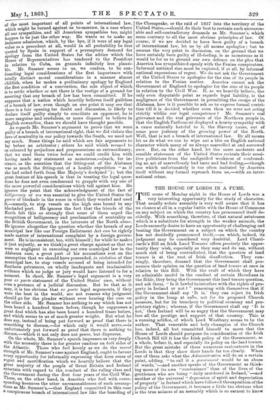THE HOUSE OF LORDS IN A FUME.
THE scene of Monday night in the House of Lords was a very interesting opportunity for the study of character. That usually sedate assembly is very well aware that it has no chance at all in a regular battle with the House of Commons on any subject on which the country has pronounced itself decidedly. With something, therefore, of that natural astuteness which is a substitute for strength in the weaker animals, the Lords earnestly desire to have an opportunity of challenging and beating the Government on a subject on which the country has not decidedly pronounced itself,—on which, indeed, its judgment may be considered very doubtful. Lord Clanricarde's Bill on Irish Land Tenures offers precisely the opportunity they wish, especially as they may and do say, without much risk of being contradicted, that the question of land tenure is at the root of Irish disaffection. They cunningly, therefore, demand that the Government shall pronounce their opinion on the question of land tenure at once in relation to this Bill. With the craft of which they have an admirable model in the conduct of certain Herodians in the Bible, they bring the Government this land tenure question, and ask them, " Is it lawful to interfere with the rights of property in Ireland or not ? " reasoning with themselves that if the Government shall say It is,' they can reject its Irish policy in the lump at mite, not for its proposed Church measure, but for its treachery to political economy and proprietary rights ; whereas, if the Government shall say It is not,' then Ireland will be so angry that the Government may lose all the prestige and support of that country. This is a cunning artifice, of which Lord Westbury seems to be the author. That venerable and holy champion of the Church has, indeed, all but committed himself to move that the House of Lords should postpone its consideration of the Irish
Church Bill till it has the Irish policy of the Government, as a whole, before it, and especially its policy on the land tenure. But the great mistake of these numerous malcontents in the Lords is that they show their hands far too clearly. When one of them asks what the Administration will do on a certain point, adding, " to call it a government would be an abuse of words,"—and another speaks of the Government as thinking more of its own "convenience" than of the lives of the gentlemen who are being " daily murdered in Ireland,"—and another of the universal " depression of spirit and depreciation of property" in Ireland which have followed the exposition of the policy of the Government, it becomes a little too obvious what is the true animus of an assembly which is so earnest to know what the Government intend to do in a critical matter on which the country has not declared itself, before it assents to their policy on another critical matter on which the country has emphatically declared itself. The Lords hope to save the Irish Church by shifting the field of battle to a new question, on which the Lords feel that freedom of action which on the Church question is exchanged for one of miserable cramp and fear.
With the House of Lords in this state of mind, fretting against the fetters which they cannot but recognize, meditating on the most ingenious devices which even Lord Westbury can invent for escaping from their uncomfortable position, and not hopeful enough of success to avoid a certain querulousness, a sort of suppressed wail, in their tone as they air those devices and see how comfortless they look, the Liberal minority stand in need of a certain artistic feeling for the situation in their leader, and no artistic feeling could be finer or keener than Lord Granville's. The Duke of Argyll is too strait-laced and austere a master. He throws the " taws " at rebellious friend and bitter foe with a schoolmasterish energy which excites fresh resentment and breeds fresh conspiracies against the Government. But Lord Granville's management of the House is quite maternal,—not in a merely fond sense, for Lord Granville, mild as he is, is particularly firm, and though he purrs beautifully as he strokes each of his opponents one by one with his velvet touch, there is a certain sharp sensation left behind when that touch is removed which carries with it the sense of gently inflicted but deliberate punishment by one who loves wisely and not too well. What a Liberal leader of the House of Lords in such a situation has to do seems to us to be this,—to give no needless offence, to be the essence of bland courtesy, and yet to keep constantly before both the mind and the imagination of that distinguished assembly, that so far from representing the actual opinion of the country, they are in a small moral and intellectual minority—while the minority in the Lords really speaks with the dignity and authority and weight of the mouthpiece of a fixed national conviction. No one could effect this purpose so well as Lord Granville. The perfect serenity with which he counted over his formidable opponents, indicating by a gay criticism on each how little his own imagination had been affected by the weight of those opponents' disapprobation, could not but, and evidently did, bring home to the Peers how very little their opinion in these great matters weighs with the country. The playful manner in which he weighed Lord Westbury's boast of attendance on all the meetings of the Irish Land Tenure Committee " at which the services of a lawyer were required," and remarked that such meetings must have been very few, as the return of his attendances shows how slight a tax they made upon Lord Westbury's time ; the gentle banter of Lord Salisbury for his avowal of that prejudice of his (with which Lord Granville had been previously " unacquainted ") against antithetical and well-balanced sentences, and for his prepossession in favour of Lord Granville's own "slip-slop English"; the demure surprise with which he pointed out to Lord Cairns that he seemed to have become a KnowNothing as to Irish land tenures since the time when he had expressed so strong an opinion in favour of retrospective compensations to the tenant ; the respectful amusement with which he chronicled Lord Grey's two " common forms " for his opening strictures on the Government—one, that he had heard "with the deepest regret " all that Lord Granville had said as the exponent of the Government, the other that, strong as had been his previous conviction, all the arguments which the leader of the House of Lords had used against him had greatly strengthened him in that conviction,—each and all of these light touches just expressed exactly what it was needful to express, that the Government fully understood the true spirit of the demand for a measure on Irish land, and instead of being betrayed by it into rashness or imprudence, were only amused at its innocent credulity. Like wise mothers, who, instead of taking serious offence at their children's ebullitions of temper, treat them with a little affectionate, but humiliating sarcasm, Lord Granville as good as told Lord Grey, and Lord Westbury, and the Duke of Somerset, and Lord Cairns that the meaning of their little plots, and their promises of friendly and candid consideration for any land measure of the Government's, were as well understood as their side-blows at the Church measure, and were by no means important enough to annoy the Government at all. If Lord Westbury likes to move, on the coming up of the Irish Church Bill to the House of Lords, that the consideration of it be deferred till the House has the whole Irish policy of the
Government before it,—why not I The Lords, if they have the least grain of wisdom in them, will shrink from his side in any attempt so perilous to obstruct a measure on the justice of which the whole nation has pronounced its find sentence. And if they do not, — if they venture to fight under the banner of this holy champion to whom the Church looks up in its extremity, why then so much the worse for the House of Lords. The only result will be that the country will at once infer that the House of Lords has ceased to be a national assembly, and has become an anti-national one. Bland fixity of purpose, varied by a gentle and placid amusement at the futile mancenvms by which the recusant Lords hope to beguile Government from its unassailable position, could not be more perfectly expressed than in Lord Granville's genial and light-hearted review of the various onslaughts of the enemy. After that, it was impossible even for Lord Grey to nurse the fond conviction that the Government felt their position unsafe or uncertain. What Lord Granville's speech really expressed was just the firm maternal sentiment, " This is a very natural impatience in you, my dears, for which I hope I can fully allow ; it is childish, of course, but I know very well that you are children. Still, you should be beginning to learn by experience, and you ought to know by this time that I can't alter my plans to suit your boyish impatience ; so try and be good boys, and submit." That is far wiser treatment than the Duke of Argyll's " taws."































 Previous page
Previous page